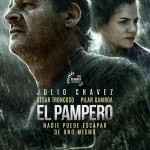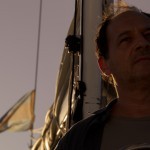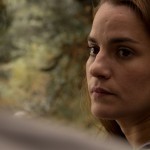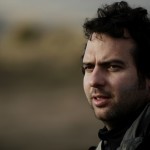EL PAMPERO
– Technical Info / Información Técnica:
(2017) / 01:17:00 / Epic Dragon / 24 FPS / ratio 1.85:1 / COLOR / SOUND 5.1 / Argentina-Uruguay-Francia / drama
– Synopsis / Sinopsis:
A man hemmed in by his terminal illness decides to draw himself away from everything and embark upon a journey in his old sailing boat, fully stocked with provisions and seeking refuge in nature’s embrace. A young woman, escaping from a crime she claims to have not committed, will disrupt his plans. Helping her escape from the clutches of a coast guard in need of company will be the last chance for him to feel alive.
Un hombre, acorralado por una enfermedad terminal, decide alejarse de todo y encara un viaje en su antiguo velero, repleto de provisiones, para refugiarse en medio de la naturaleza. Una chica que huye de un crimen que dice no haber cometido lo hará cambiar el rumbo. Ayudarla a escapar de las garras de un guarda costas necesitado de compañía será su última oportunidad para sentirse vivo por última vez.
– Director´s Biography / Biografía del Director:
MATÍAS LUCCHESI
Matias Lucchesi was born in Córdoba, Argentina, in 1980. He studied acting, scriptwriting and playwriting. His short film “Distancias” (2010) won the prize for best short at the Biarritz Film Festival. He shot his first feature film “Ciencias Naturales”. The film was awarded in 2014 Best Feature Film Generation at the Berlinale; Best Film, Best Actress and Best Script at the Guadalajara Film Festival; Special Mention of the Jury – Horizontes Latinos – San Sebastián Fim Festival. “El Pampero” is his second feature film.
Matías Lucchesi nació en Córdoba, Argentina en 1980. Cursó distintos estudios de teatro y dramaturgia. Su cortometraje “Distancias” (2010) fue ganador del Festival de Cine de Biarritz. Su primer film fue “Ciencias Naturales”. El Film ganó Mejor película en la sección Generation de la Berlinale 2014; Mejor Película, Actriz y Guión en Guadalajara 2014 y Mención Especial del Jurado en Horizontes Latinos del Festival de San Sebastián 2014. El Pampero es su segundo largometraje.
– Director Statement / Declaraciones del Director:
There is a phrase in sailing that one repeatedly hears whenever facing a strong headwind: “We can’t but zig-zag”. This means that one cannot sail to where one wants to go in a straight line. One has to do it by zig-zagging in order to take advantage of the wind’s thrust hitting on the sail, rather than splitting through it and trying to get there as quickly as possible, when reality imposes itself like a wall. This image has echoed in my mind since I first heard it in my childhood in the lakes of Córdoba. Now I hear it in every port I visit when I go sailing in the River Plate with my modest sailboat and the weather changes. The analogy between sailing and life brings about a sequence of mental images that very often help me solve my problems. My relationship with my father, who passed away the dawn after my tenth birthday, was always one of my issues to solve. That day, before his death, we only had an argument. In the story we have shot, our main character had the opportunity to redeem himself with his son thanks to the limit situation that life brought about. Sailing will be the stage, the vehicle through which all frustrations merge into the possibility of helping a vulnerable person in desperate need. Perhaps in the way that I would have needed him to ask for my forgiveness that night on my tenth birthday. Our main character cannot face his problems with his son directly, but he does manage to face them through another experience that moves him. Somehow, he manages to work out his problems by zig-zagging. My motivation to make this film comes from my childhood, far from using this film as some kind of self-indulgent fix, I am simply trying to use these experiences in an attempt to transform them into something positive and alive.
En la navegación a vela hay una frase que se escucha siempre cuando el viento sopla fuerte en contra: “No queda otra que tirar bordes”. Esto quiere decir que no se puede ir en línea recta a dónde queremos ir. Hay que hacerlo en zigzag para aprovechar el impulso del viento que pega en la vela y no romperse entero tratando de llegar lo más rápido posible cuando la realidad se impone como una pared. Esta imagen me resonó siempre desde que la escuché por primera vez en mi infancia en los lagos de Córdoba. Ahora la escucho en cada puerto que toco cuando salgo en mi pequeño velero a navegar por el Río de la Plata y las condiciones climáticas cambian. La analogía entre la navegación y la vida me despiertan una secuencia de imágenes que muy a menudo logran destrabar lo que encuentro trabado. Una de estas cosas a destrabar siempre fue la relación con mi padre, que falleció una madrugada después del día de mi cumpleaños número diez. Ese día, antes de su muerte, lo único que tuvo conmigo fue una discusión. En esta historia nuestro protagonista tiene la oportunidad de redención con su hijo gracias a una situación límite que viene de afuera. La navegación como escenario, como el vehículo por el cual todas las frustraciones se topan con la posibilidad de ayudar a alguien vulnerable que lo necesita desesperadamente. Quizás como yo hubiera necesitado un pedido de perdón esa noche de mi cumpleaños número diez. Nuestro protagonista no puede enfrentar sus problemas directamente con su hijo pero sí lo consigue a través de otra experiencia que logra conmoverlo. De alguna manera, llega a destrabar su traba con su hijo “Tirando bordes”. La motivación para realizar esta película germina en mi infancia, no sólo por esa madrugada fatal sino por todas las experiencias que no pude vivir con mi padre. Esta historia da oportunidades, quizás al límite y ya casi sin aliento pero las da. Sus personajes tienen ese tiempo que yo no tuve y mi padre tampoco. Lejos de buscar una reparación egoísta con esta película simplemente intento poner en juego todas esas vivencias para transformarlas en al positivo y vital.
– Overview / Ficha técnica:
Script / Guión: Matías Lucchesi, Gonzalo Salaya
Producer / Producción: Juan Pablo Miller (Tarea Fina-Argentina), Matías Lucchesi (Salta La Liebre-Argentina)
Co-producer / CoProducción: Seacuatico (Uruguay) / Metaluna Productions (France), DEPSA (Argentina)
Executive Productor / Productor Ejecutivo: Juan Pablo Miller
Director / Director: Matías Lucchesi
Assistant Director / Asistente de Dirección: Mariano Biasin
Director of Photography and Camera / Dirección de Fotografía y Cámara: Guillermo Nieto
Film Editor / Edición: Delfina Castagnino
Art Director / Dirección de Arte: Adrián Suarez
Costume Designer / Vestuario: Laura Donari
Make Up Artist / Maquillaje: Celeste Dunan
Sound design / Diseño de sonido: Martin Litmanovich
Música / Music: Sebastián Escofet
Cast / Elenco: Julio Chávez, Pilar Gamboa, Cesar Troncoso
– Festivals, Awards and Nominations / Festivales, Premios y Nominaciones:
– Miami International Film Festival; 03/2017; US.
– BAFICI; 04/2017; Argentina.
– Links:
Trailer English Subtitles: https://vimeo.com/207303540
Facebook: https://www.facebook.com/TareaFinaCine/
– Contact / Contacto:
Gisela Chicolino
FilmsToFestivals
Connecting Films with Festivals
Juan Pablo Miller
Tarea Fina




